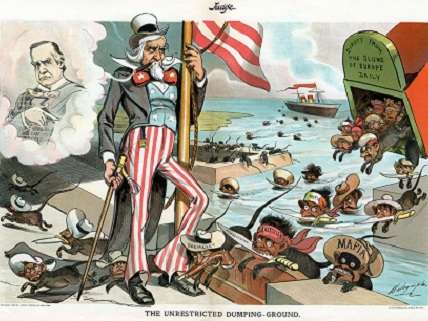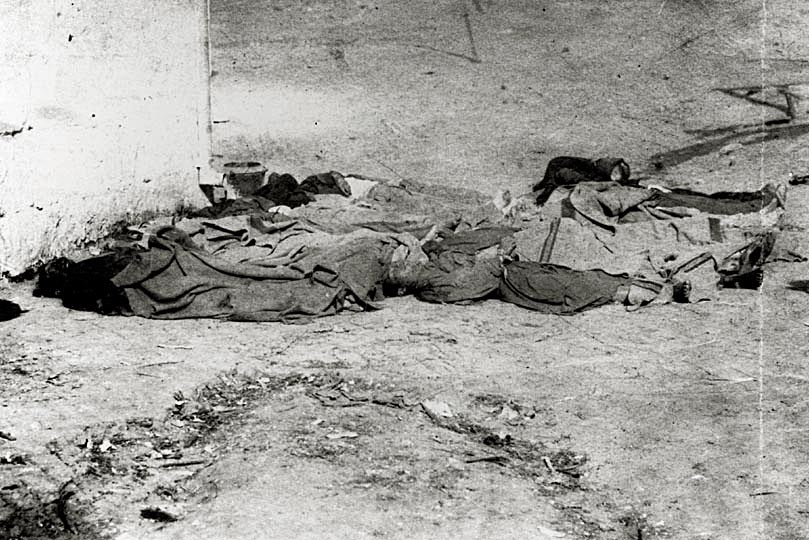Will We Build a Wall Against Chinese Immigrants, Too?
America has never been a "white" country. Economic and cultural nativism is on the rise - and the most un-American idea of all.

Can you guess who the victims were of the largest mass-lynching in American history and where it took place? Most people would, I think, guess blacks first, then maybe Mexicans or Native Americans. And we'd assume it was somewhere in the old Confederate states. Writing in the Boston Globe, Jeff Jacoby notes that the 18 men and boys killed on October 24, 1871 were chosen dragged out of their houses and beaten and hanged because they were Chinese. The locale wasn't Alabama or Mississippi, either. It was Los Angeles, California.
They were Chinese, and they were murdered by a mob, nearly 500 strong, that included some of the city's leading citizens.
"Their first victim was an elderly, inoffensive Chinaman, whom they seized and dragged headlong through the streets, beating and abusing him at every step," the Los Angeles Daily Mirror later recounted. At the corner of Temple and New High streets, the lynch party tied a noose around the old man's neck and hauled him up. "The rope broke and the unfortunate wretch, innocent of any wrong, asked for mercy from his cruel tormentors. This was denied with jeers, and he was again hung up; this time successfully."
As readers of Reason know, the first mass exclusions on the basis of country of origin (then as now a proxy for protean categories of race) covered the Chinese in a law titled with unabashed descriptiveness: The Chinese Exclusion Act of 1882. (Read Erika Lee's recent history The Making of Asian America for more.)
Jacoby notes that Chinese now comprise the single-largest group emigrating to the United States:
In 2013, according to the Census Bureau, China was the country of origin for 147,000 US immigrants, compared to just 125,000 who came from Mexico. Over the previous 10 years, immigration from China and other Asian countries had been rising, while immigration from Mexico decreased. Since at least 2009, reported demographer Eric Jensen, more immigrants to America have been Asian than Hispanic. By 2013, the disparity was unmistakable: Asians accounted for 40.2 percent of the total immigration flow. Hispanics made up only 25.5 percent.
Last week, The Wall Street Journal crunched even more recent numbers. "In 2014, there were 31 states where more immigrants arrived from China than from Mexico. . . . Even in California, a top destination for Latinos, Chinese immigrants outnumbered Mexican immigrants." (The data include all immigrants, legal and illegal.)

If Mexicans are the enemy within—all this talk of deporting millions of undocumented immigrants is mostly aimed at them—China has mostly replaced Russia or Japan as our major enemy without. Hillary Clinton, Bernie Sanders, virtually all of the failed GOP candidates for president, and especially Donald Trump mince no words in saying they will hold China accountable for flexing its regional military might, "manipulating" its currency (something all national central banks do simply by existing), and especially "stealing" American jobs. And of course, Chinese immigrants in America threaten "us" in a way that is less like low-skilled Mexicans and more like the fears stoked by Jews back in the early 20th century: Chinese kids are so super-smart, especially in math and engineering, right, that they aren't taking manual-labor gigs away from low-income, low-skilled natives? They're taking away all the slots at the University of California system and maybe even the Ivy League! They're not human, they work too hard!
Jacoby closes his piece with a trenchant observation about how "we" (real Americans, who can trace at least two generations in the U.S. of A.!, but not inlcuding blacks) always eventually do the right thing after exhausting all other options:
We look back today at the demonization of Chinese immigrants in the 1870s and 1880s and are aghast that so many Americans could have spouted such ludicrous, ugly stuff. We have come a long way from the Chinese Exclusion Act to today's robust Asian immigration flows. A generation or two hence, Americans will look back at the harsh and unworthy immigration politics of our time, and be equally aghast that Mexicans were so reviled, and US citizens so willing to be deluded.
He's right about that. We eventually accept most ethnicities as A-OK (again, except for blacks and maybe American Indians). When my maternal grandparents (and as many of their relatives who could scrape together the money for a steerage-class ticket) showed up in America in the 1910s from god-forsaken southern Italy (a very distinct place than practically Austrian/French/Swiss and hence semi-legitimate northern Italy), they weren't white. No, they and their dusky skin, short bodies, and (obvious!) lack of intellectual capacity and impulse control were a big part of The Passing of the Great Race, or the pollution of the Nordic blood that defined true Americans, in Madison Grant's influential, idiotic thought. One of the great achievements of the 20th century (for my family, at least) was that my parents, born of Italian parents on side and Irish immigrants on the other, emerged as fully white and American within 40 or 50 years of being born. It only took suffering through the Depression, really, and supplying infantry members in World War II and Korea. Certainly, by the early 1970s (when the foreign-born population was at a historic low), nobody was questioning whether micks and wops didn't belong; the same went for Jews, whether they came originally from Germany, Poland, Russia, or wherever. In an era of rising crime rates, street violence, and economic empowerment of often-ethnic sports and movie stars who weren't interested in taking a back seat, traditional white America had bigger problems and needed more troops to fight off the onslaught of Puerto Ricans and Dominicans in the Northeast, Mexicans in the Southwest, and blacks and American Indians everywhere (the numbers of these latter two groups weren't increasing, but they were increasingly restive). Japanese went from being interned during World War II to being honorary whites and the same was kinda-sorta true for Chinese, Koreans, and Vietnamese refugees (once they learned unaccented English, at least).
What counts as "white" has always been fluid and fraudulent, but it often (always?) comes at the expense of some new out-group. Hell, in the days after the 9/11 attacks, even blacks were "white" for a while, because we were all united against Arabs or Muslims (and maybe Sikhs, because they seemed like kind of the same thing and people still aren't making clear distinctions between nationalities and religion). Jacoby is sanguine that anti-Chinese animus is deeply buried in the past, like coolies in a mountain landslide during the building of the transcontinental railroad. I'm not so sure, especially if economic growth continues to snail-pace along at less than 2 percent a year. That sort of anemic expansion—a product of all sorts of things, including out-of-control government spending, ever-increasing regulatory dicta, and forcibly misallocated dollars into everything from defense spending to insurance premiums to ineffective safey rules—makes us all crabs in a pot that seems to be getting smaller all the time. The water gets hotter and well, you start fighting like nobody's business to kick out everyone you can. If Chinese immgrants keep coming over in relatively large numbers, Chinese Americans keep doing well here, and China continues coming into focus as our major economic and military adversary on the world stage, we could easily see a resurgence of the worst sort of populist racism and discrimination.
In an exchange related to his column, the Globe's Jacoby tweeted this out:
America's not a 'white, European' country. It's a nation built on ideas, not race & soil. Nativists don't grasp #AmericanExceptionalism. https://t.co/eMjQlh0DGw
— Jeff Jacoby (@Jeff_Jacoby) September 19, 2016
I think that's just about exactly right. Certainly, it helps explain that amazing and largely unremarked upon fact of assimilation and acculturation that my parents, especially on my mother's side, as Italians were more "foreign" than Irish, managed in less than a lifetime. My mother's parents never spoke English their entire lives, yet before they died, the Italian-American immigrant experience, as cartoonishly but powerfully expressed in The Godfather novel and movies, had become the American experience. When my folks got married in 1950, it was considered a species of mixed marriage (made possible only by the fact that they were both Catholic, itself a centuries-old marker for being less-than-fully "American"). The idea of America as a place where anyone from anywhere can come and express their potential through radical economic, cultural, and political freedom is what's exceptional about this country. At its best, America is always something new and constantly changing, becoming, one hopes, ever-more inclusive and expansive. There's always room for more of everything in a country that has barely gotten started.


Show Comments (185)